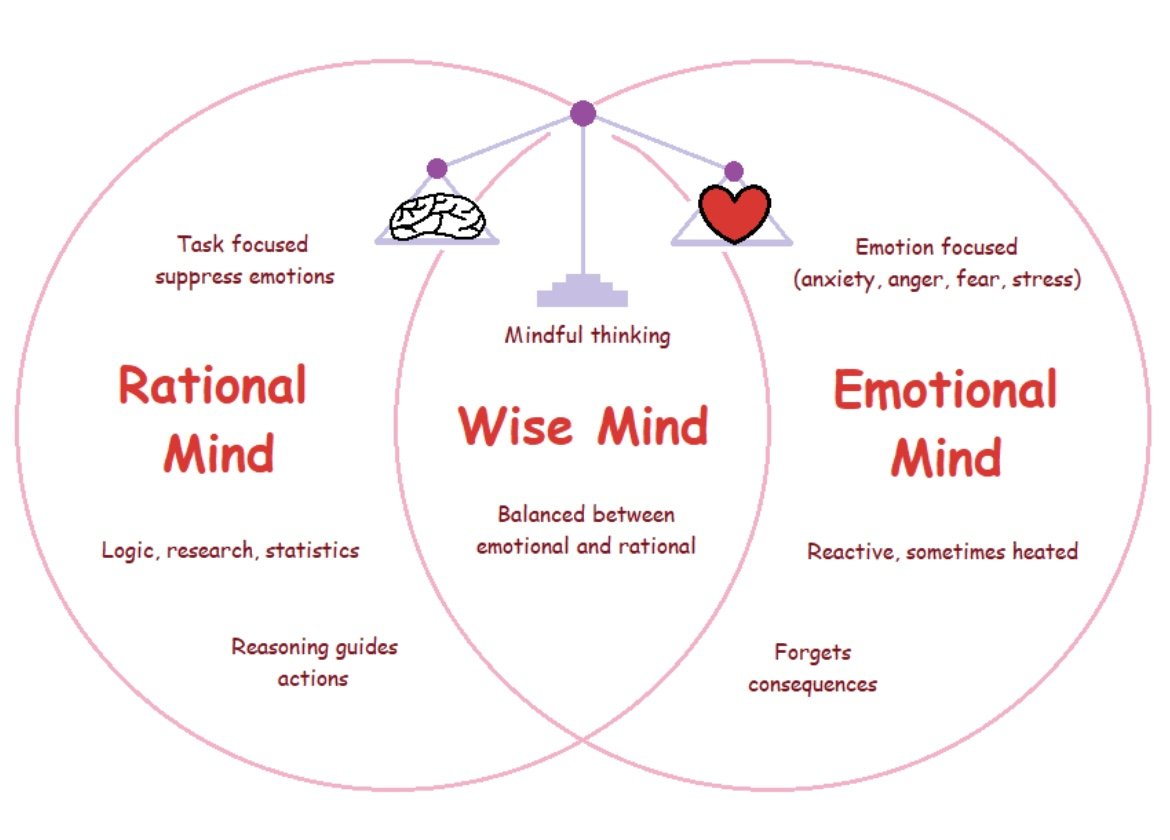We all have an emotional mind, a rational mind, and a wise mind. But what are they? And why should we practice Wise Mind?
When we are in the “emotional mind” this is when we are ruled by our moods and feelings. Often when we are in this state of mind, facts, logic and reasons are not important. We are simply reacting based on our emotions. Usually this happens when emotions are running high. For example, when I saw that the new iPhone came out (yay!) I got so excited that I immediately added it to my shopping cart. Credit card bills be damned.
When we are in the “rational mind” this is when we are ruled by facts, logic and reason. Feelings and emotions are not important when we are in this state of mind. Using that same iPhone example above, if I was in the rational mind, I would recognize the fact that I am not a baller, I already have the latest iPhone in perfect condition, and that I simply do not need to buy a new iPhone.
The “wise mind” is the happy middle ground between the emotional mind and the rational mind, taking into account both your urges/feelings AND the facts/logic. Again, using my same iPhone example, if I was in the wise mind, I would acknowledge my financial situation, even though I am super excited about the new iPhone with the fancy cinematic camera function. Instead of rushing to buy the iPhone right away, I would look into trading in my last phone to help with the costs, and perhaps put aside some money over the next few pay cheques before making such a large purchase.
If each of these minds were represented as fictional characters:
The Emotional Mind: Homer from the Simpsons, or Kelly from The Office
The Rational Mind: Sheldon Cooper from The Big Bang Theory, or Spock from Star Trek
The Wise Mind: Yoda from Star Wars
Both the emotional mind and the rational mind are important in our decision making process, but it can be detrimental if we only operate in one or the other. By finding that balance between the two, we can acknowledge our feelings while honoring the facts and reasoning.
As someone who is suffering from depression, anxiety and PTSD, it is difficult for me to operate outside of my emotional mind. I am easily triggered and driven by the overwhelming emotions and intrusive thoughts. Below are a few tips that I find helpful to get me from the emotional mind to the wise mind.
Distraction - this will allow myself to get some distance so that my emotions aren’t running as high and I don’t do anything I will regret later. The distractions can be any activity that takes you away from that immediate thought or situation. It could be watching an eppy on Netflix, going for a walk, texting a friend etc.
Repeating a positive affirmation that will help ground you. I have a few that I would repeat to myself such as, “you are safe”, “this feeling will pass” etc.
Opposite emotion/action - doing the opposite of what I’m feeling. For example, I know that when I’m angry I may want to say something hurtful, so instead I will take a sip of water or walk away from the situation. Or when my depression takes over and I can’t get out of bed, I will force myself to get up for a snack just to get my body moving. I do find this one quite difficult, but when I am able to achieve this, I am usually proud of myself later when I reflect on what happened.
It takes practice to be in the wise mind, especially since our emotions can be so overwhelming sometimes. Please remember to be kind to yourself, and take it one day at a time. Being compassionate with yourself can go a long way when working on your mental health.

